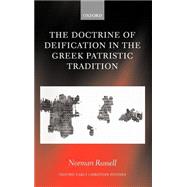The Doctrine Of Deification In The Greek Patristic Tradition
, by Russell, Norman- ISBN: 9780199265213 | 0199265216
- Cover: Hardcover
- Copyright: 3/24/2005
This book is the first detailed survey of the patristic doctrine of defication since Jules Gross's landmark study of 1938. It traces the history of deification from its birth as a second-century metaphor with biblical roots to its maturity as a doctrine central to the spiritual life of the Byzantine Church. It begins with two chapters on the doctrine's antecedents in Graeco-Roman and Jewish culture which draw attention to the hitherto overlooked contribution of Rabbinic exegesis, and also to the surprising fact that in speaking of the soul's ascent to God as deification Christian writers anticipated the pagan Neoplatonists rather than the other way round. Although the first enunciation of deification is in Irenaeus' celebrated 'exchange formula', it was in Alexandria that the doctrine was fully elaborated. Two important chapters discuss and contextualize the different Alexandrian approaches from Clement to Cyril, bringing out the pervasive influence of Origen, who develops the idea of the rational creature's participation through the Son and the Spirit in a dynamic divinity deriving from the Father. It is striking that the technical vocabulary of deification becomes problematical for Cyril of Alexandria, who replaces it with references to 2 Peter 1:4 ('partakers of the divine nature'). It was therefore through Pseudo-Dionysius and Maximus the Confessor rather than Cyril that deification entered the Byzantine tradition. Maximus' many discussions of deification (or 'theosis') are examined in detail, for in his concept of theosis as God's gift of himself to human beings through participation in the divine energies the patristic doctrine of deification comes to full maturity. The final chapter shows how Maximus' synthesis informed the hesychast tradition and takes the discussion up to the contribution of deification to recent theological reflection on the nature of the human person. Two appendices review deification in the Syriac and Latin Fathers, and present a survey of the Greek vocabulary of deification, completing Habicht's Gottmenschentum by including Christian writers to the end of the fifth century. Book jacket.






